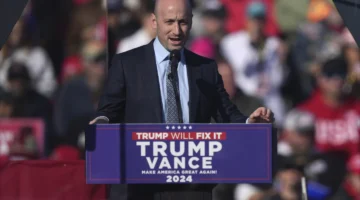Supreme Court to rule on Trump bid to end ‘dreamers’ program
By MARK SHERMAN Associated Press
WASHINGTON (AP) — Adding a high-stakes immigration case to its election-year agenda, the Supreme Court said Friday it will decide whether President Donald Trump can terminate an Obama-era program shielding young migrants from deportation.
The justices’ order sets up legal arguments for late fall or early winter, with a decision likely by June 2020 as Trump campaigns for re-election. The president ordered an end to the program known as DACA in 2017, sparking protests and a congressional effort to salvage it.
That effort failed, but federal courts in California, New York, Virginia and Washington, D.C., have blocked him from ending it immediately. A federal judge in Texas has declared the program is illegal, but refused to order it halted .
The program — Deferred Action for Childhood Arrivals — protects about 700,000 people, known as dreamers, who were brought to the U.S. illegally as children or came with families that overstayed visas.

Supreme Court in Washington, at sunset. The Supreme Court is hearing arguments in a case that could deal a painful financial blow to organized labor. All eyes will be on Justice Neil Gorsuch on Monday, Feb. 26, 2018, when the court takes up a challenge to an Illinois law that allows unions representing government employees to collect fees from workers who choose not to join. The unions say the outcome could affect more than 5 million government workers in 24 states and the District of Columbia. (AP Photo/J. Scott Applewhite, File)
The DACA protections seem certain to remain in effect at least until the high court issues its decision.
The administration had asked the court to take up and decide the appeals by the end of this month. The justices declined to do so and held on to the appeals for nearly five months with no action and no explanation. The court did nothing Friday to clear up the reasons for the long delay, although immigration experts have speculated that the court could have been waiting for other appellate rulings, legislation in Congress that would have put the program on a surer footing or additional administration action.
Since entering the White House, Trump has intermittently expressed a willingness to create a pathway to citizenship for the hundreds of thousands of immigrants who’ve been protected by DACA. But he’s coupled it with demands to tighten legal immigration and to build his long wall along the Mexican border — conditions that Democrats have largely rejected.
With the 2020 presidential and congressional election seasons underway or rapidly approaching, it seems unlikely that either party would be willing to compromise on immigration , a touchstone for both parties’ base voters. Three decades of Washington gridlock over the issue underscore how fraught it has been for lawmakers, and there’s little reason to think a deal is at hand.
On the campaign trail, nearly all of the two dozen Democratic presidential candidates have pledged to work with Congress to provide a pathway to citizenship for millions of people in the country illegally — beginning with the dreamers. On the other hand, Trump sees his hardline immigration policies as a winning campaign issue that can energize his supporters.
“We are pleased the Supreme Court agreed that this issue needs resolution. We look forward to presenting our case before the court,” Justice Department spokesman Alexei Woltornist said.
California Attorney General Xavier Becerra said in a conference call with reporters that the high court’s ruling Thursday barring, for now, a citizenship question on the 2020 census “demonstrates that the court’s not going to be fooled by the Trump administration’s clearly disingenuous efforts when it comes to trying to undo and backslide on a lot of the laws and regulations that are there to protect our health and our welfare.”
The Obama administration created the DACA program in 2012 to provide work permits and protection from deportation to people who, in many cases, have no memory of any home other than the United States.
The Trump administration has said it moved to end the program under the threat of a lawsuit from Texas and other states that raised the prospect of a chaotic end to DACA.
Then-Attorney General Jeff Sessions determined the program to be unlawful on the grounds that President Barack Obama did not have the authority to adopt it in the first place. Sessions cited a 2015 ruling by the federal appeals court in New Orleans that blocked a separate immigration policy implemented by Obama and the expansion of the DACA program.
Texas and other Republican-led states eventually did sue and won a partial victory in a federal court in Texas. Civil rights groups, advocates for immigrants and Democratic-led states all have sued to prevent the end of the program.
In November, a three-judge panel of the federal appeals court in San Francisco ruled that the administration decision to end DACA was arbitrary and capricious.
The appeals court noted that the federal government has a long and well-established history of using its discretion not to enforce immigration law against certain categories of people.
While the federal government might be able to end DACA for policy reasons under its own discretion, it can’t do so based on Sessions’ faulty belief that the program exceeds federal authority, the court held.
___
Associated Press writers Alan Fram, Will Weissert and Don Thompson, in Sacramento, California, contributed to this report.










No Comment